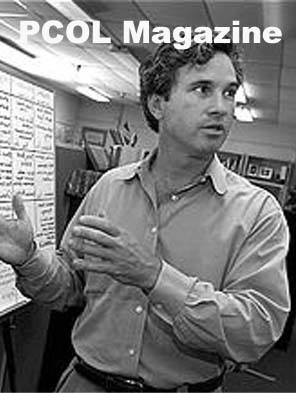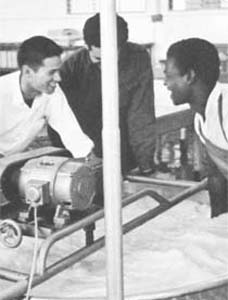March 9, 2005: Headlines: COS - Thailand: NGOs: Staff: Chief of Staff: Wharton Knowledge: Thomas Tighe, president and chief executive officer of Direct Relief International, a nonprofit medical charity operating around the world since 1948, said the most important healthcare asset in developing nations is the people in the country who are already trained to provide medical services.
Peace Corps Online:
Directory:
Thailand:
Special Report: Direct Relief International Head Thomas Tighe:
February 9, 2005: Index: PCOL Exclusive: RPCV Thomas Tighe (Thailand) :
March 9, 2005: Headlines: COS - Thailand: NGOs: Staff: Chief of Staff: Wharton Knowledge: Thomas Tighe, president and chief executive officer of Direct Relief International, a nonprofit medical charity operating around the world since 1948, said the most important healthcare asset in developing nations is the people in the country who are already trained to provide medical services.
Thomas Tighe, president and chief executive officer of Direct Relief International, a nonprofit medical charity operating around the world since 1948, said the most important healthcare asset in developing nations is the people in the country who are already trained to provide medical services.

Thomas Tighe, president and chief executive officer of Direct Relief International, a nonprofit medical charity operating around the world since 1948, said the most important healthcare asset in developing nations is the people in the country who are already trained to provide medical services.
Making Viagra Instead of Vaccines
Thomas Tighe, president and chief executive officer of Direct Relief International, a nonprofit medical charity operating around the world since 1948, said the most important healthcare asset in developing nations is the people in the country who are already trained to provide medical services.
For 30 years, he said, countries struggling to build their economies have been investing what little resources they have in training healthcare workers. However, those who have received the training are often the people with the skills and knowledge of English to immigrate to countries with more opportunity.
One way to keep healthcare workers in their home countries is to provide the equipment and supplies necessary for them to feel they are able to accomplish something, Tighe argued. Direct Relief provides supplies through donations from healthcare companies, including pharmaceutical firms, from around the world. The group is able to provide therapy for 14 million patients a year on a budget of $3 million because it receives donations that would have a wholesale value of $100 million.
In addition to money and supplies, he said, healthcare workers in poor nations should be encouraged to stay put through programs that heap respect onto them and offer respect and recognition in professional circles. The same goes for drug companies. "We try to work with the industry and encourage them to do what they do really well -- make drugs that save lives -- and turn the power that exists in the corporate structure for non-commercial purposes. They won't make any money out of giving drugs to our clinics, but there's enormously high social importance," he said. "We ride on the backbone of industry to get them to steer attention from the commercial market to the market of needs."
To make an additional pill -- or thousands of additional pills -- costs very little, he explained. The bulk of the cost of a pharmaceutical product is in the research and development process. Tighe, too, noted the failure of drug companies to develop new products for people in the developing world. "The market will give you Viagra," he said, "but it won't give you vaccines for poor kids."
He acknowledged that his organization's model, based largely on donations, may not be sustainable. But he pointed out that the United States does not have a true, sustainable business model for healthcare delivery and relies heavily on government financing. "Sustainability is a bugaboo in development. We want people in these countries to do what we ourselves don't ... Sustainability is a great idea, but we have not been able to do it in our country which is the richest in the world. So take that and look at the poorest countries in the world. It's an enormous challenge."
When this story was posted in March 2005, this was on the front page of PCOL:
 | The Peace Corps Library
Peace Corps Online is proud to announce that the Peace Corps Library is now available online. With over 30,000 index entries in over 500 categories, this is the largest collection of Peace Corps related reference material in the world. From Acting to Zucchini, you can use the Main Index to find hundreds of stories about RPCVs who have your same interests, who served in your Country of Service, or who serve in your state. |
 | RPCVs in Congress ask colleagues to support PC
RPCVs Sam Farr, Chris Shays, Thomas Petri, James Walsh, and Mike Honda have asked their colleagues in Congress to add their names to a letter they have written to the House Foreign Operations Subcommittee, asking for full funding of $345 M for the Peace Corps in 2006. As a follow-on to Peace Corps week, please read the letter and call your Representative in Congress and ask him or her to add their name to the letter. |
 | March 1: National Day of Action
Tuesday, March 1, is the NPCA's National Day of Action. Please call your Senators and ask them to support the President's proposed $27 Million budget increase for the Peace Corps for FY2006 and ask them to oppose the elimination of Perkins loans that benefit Peace Corps volunteers from low-income backgrounds. Follow this link for step-by-step information on how to make your calls. Then take our poll and leave feedback on how the calls went. |
 | Coates Redmon, Peace Corps Chronicler
Coates Redmon, a staffer in Sargent Shriver's Peace Corps, died February 22 in Washington, DC. Her book "Come as You Are" is considered to be one of the finest (and most entertaining) recountings of the birth of the Peace Corps and how it was literally thrown together in a matter of weeks. If you want to know what it felt like to be young and idealistic in the 1960's, get an out-of-print copy. We honor her memory. |
 | Make a call for the Peace Corps
PCOL is a strong supporter of the NPCA's National Day of Action and encourages every RPCV to spend ten minutes on Tuesday, March 1 making a call to your Representatives and ask them to support President Bush's budget proposal of $345 Million to expand the Peace Corps. Take our Poll: Click here to take our poll. We'll send out a reminder and have more details early next week. |
 | Peace Corps Calendar: Tempest in a Teapot?
Bulgarian writer Ognyan Georgiev has written a story which has made the front page of the newspaper "Telegraf" criticizing the photo selection for his country in the 2005 "Peace Corps Calendar" published by RPCVs of Madison, Wisconsin. RPCV Betsy Sergeant Snow, who submitted the photograph for the calendar, has published her reply. Read the stories and leave your comments. |
 | WWII participants became RPCVs
Read about two RPCVs who participated in World War II in very different ways long before there was a Peace Corps. Retired Rear Adm. Francis J. Thomas (RPCV Fiji), a decorated hero of the Japanese attack on Pearl Harbor, died Friday, Jan. 21, 2005 at 100. Mary Smeltzer (RPCV Botswana), 89, followed her Japanese students into WWII internment camps. We honor both RPCVs for their service. |
 | Bush's FY06 Budget for the Peace Corps
The White House is proposing $345 Million for the Peace Corps for FY06 - a $27.7 Million (8.7%) increase that would allow at least two new posts and maintain the existing number of volunteers at approximately 7,700. Bush's 2002 proposal to double the Peace Corps to 14,000 volunteers appears to have been forgotten. The proposed budget still needs to be approved by Congress. |
Read the stories and leave your comments.

Some postings on Peace Corps Online are provided to the individual members of this group without permission of the copyright owner for the non-profit purposes of criticism, comment, education, scholarship, and research under the "Fair Use" provisions of U.S. Government copyright laws and they may not be distributed further without permission of the copyright owner. Peace Corps Online does not vouch for the accuracy of the content of the postings, which is the sole responsibility of the copyright holder.
Story Source: Wharton Knowledge
This story has been posted in the following forums: : Headlines; COS - Thailand; NGOs; Staff; Chief of Staff
PCOL17666
78
.
















